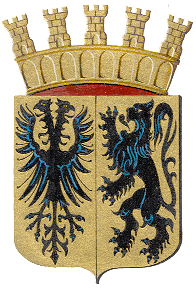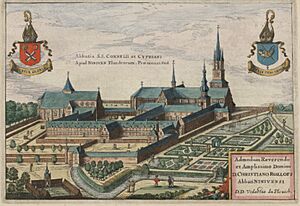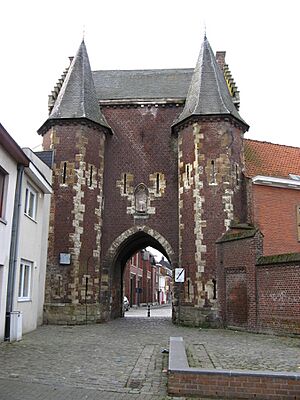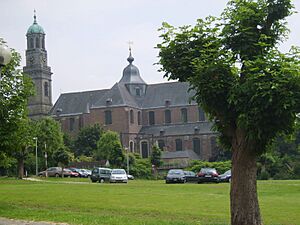Ninove facts for kids
Quick facts for kids
Ninove
|
|||
|---|---|---|---|

Collage of Ninove
|
|||
|
|||
| Country | Belgium | ||
| Community | Flemish Community | ||
| Region | Flemish Region | ||
| Province | East Flanders | ||
| Arrondissement | Aalst | ||
| Area | |||
| • Total | 51.89 km2 (20.03 sq mi) | ||
| Population
(2018-01-01)Lua error in Module:Wd at line 1575: attempt to index field 'wikibase' (a nil value).
|
|||
| • Total | Lua error in Module:Wd at line 1,575: attempt to index field 'wikibase' (a nil value). | ||
| Postal codes |
9400, 9401, 9402, 9403, 9404, 9406
|
||
| Area codes | 054 | ||
| Website | www.ninove.be | ||
Ninove is a city and municipality in the Flemish province of East Flanders in Belgium. It is located on the Dender river. Ninove is part of the Denderstreek region.
The municipality includes the city of Ninove itself and several smaller towns. These towns joined Ninove in 1976. Some of these are Meerbeke, Outer, and Okegem. As of January 1, 2023, Ninove had about 40,090 people living there. The total area is 72.57 square kilometers. This means about 553 people live in each square kilometer.
Contents
History of Ninove
The earliest name for Ninove was Neonifus, from the 9th century. Later, it was called Ninive and Nineve. The name "Ninove" has been used since the 14th century.
The exact origin of the name is not fully clear. Some think it comes from Roman times. Others believe it has Frankish roots. However, we do know what the name means. Ninove means "new pasture" or "nieuw weiland" in Dutch.
Early Settlements and Growth
During the time of the Roman Empire, Ninove was a small village. It was located in an area called "Nederwijk". When the Franks arrived around the 4th century AD, the village grew. It became a small farming town.
From 843 AD, the area where Ninove is located was part of the Holy Roman Empire. In the 11th century, Boudewijn V, the Count of Flanders, took control of this area. This made the land between the Scheldt and Dender rivers part of Flanders.
Medieval Times
Starting in the 11th century, a medieval castle was built and made stronger. Ninove was on an important trade route. This route connected Flanders and Brabant. Because of this, the town became rich and grew into a city.
In 1137, Norbertine monks from Park Abbey started the Saint Cornelius Abbey. This abbey was right next to the city. In 1295, Guy of Dampierre, the count of Flanders, bought the town and its lands. His grandson, Henry, gave Ninove its city charter in 1339. This charter gave the town special rights.
Difficult Centuries
The 15th to 17th centuries were tough for Ninove. The region faced many wars and religious conflicts. In 1578, French forces looted the abbey during the Protestant Reformation. In 1658, the French army occupied Ninove. After the Treaty of the Pyrenees, the French gave the area back to Spain. However, control of the area changed many times during the wars of King Louis XIV and Louis XV of France.
During the 17th century, Ninove suffered greatly. Warring groups demanded payments, which hurt the city. Its cloth industry also declined, leading to a big economic crisis. The large abbey was closed by the French in 1796. This happened after Flanders became part of France. In 1815, during the Waterloo Campaign, the town served as a base for cavalry soldiers.
Modern Ninove
In the 19th century, Ninove became an industrial city. By the time of the First World War, it was a major center for the Flemish match industry. However, this industry lost its importance. The last match factory closed in the late 1970s.
From 1973 to 2011, the town of Meerbeke was the finish line for the famous cycling race, the Tour of Flanders.
Ninove's population has grown steadily. The city is now an important center for shopping, fun, and business in the area. It hosts a popular annual Volkswagen car show every March. This show is for air-cooled vehicles like Beetles and Camper-vans. New shopping centers, sports facilities, and apartment buildings have made Ninove a popular place to live. Many people who work in nearby Brussels choose to live in Ninove.
The Premonstratensian Abbey
The Premonstratensian abbot of Park Abbey started the Abbey of Saints Cornelius and Cyprian in 1137. The monks settled on unused land near the town. This land was given to them by the lord of Ninove. It was located along the Dender river.
The community of monks grew, and they soon had enough money to buy nearby parishes. Lay brothers (monks who did manual labor) took care of the farm work. Because the abbey owned so much land, it became one of the biggest producers of grain in Flanders.
The 16th and 17th centuries were hard times for the abbey. There were political problems and the effects of the French wars of religion in the Southern Netherlands. The 18th century brought peace and wealth. All the abbey buildings were rebuilt. A Ghent architect designed them, with advice from Laurent-Benoît Dewez.
The abbey was closed in 1796 during the French Revolution. The monks were able to buy it back, but this took until 1822. Many of the buildings were torn down in the early 1800s. In 1813, the abbey church became the local parish church, called the Church of the Assumption of Mary.
Ninove's Nicknames
Over time, the people of Ninove have been given different nicknames. These nicknames could be a sign of honor or sometimes a joke.
The Carrot People
The people of Ninove are called "wortelmannen" or "wortels." This means "carrot people" or "carrot" in Dutch. This nickname comes from a story from the Middle Ages.
During a disagreement with the nearby city of Aalst, the people of Aalst decided to attack Ninove. The people of Ninove were caught off guard and were not ready. In the confusion, they could not find the key to lock the city gate. So, they used a carrot to try and bolt the gate shut. A donkey passing by saw the carrot and ate it! This left the city gate open, and the soldiers from Aalst could easily enter the city.
The Oldest, Boldest, and Wisest City
Antonius Sanderus described Ninove as "the Oldest, the Boldest, and the Wisest of Cities." He wrote in his book Flandria Illustrata:
"Ninive quattor habet portas. Hae portae, quamvis possint, vix umquam clauduntur: unde vulgari loco Ninove dicitur antiquissima, audaccissima, sapientissima".
This means: "Ninove has four gates. These gates, though they can be closed, are hardly ever closed: hence in common speech Ninove is called the oldest, the boldest, the wisest."
- Ninove was called the oldest because its name sounded like the ancient Assyrian city of Nineveh.
- It was called the boldest because it waited for enemies with its gates open.
- It was called the wisest because the city did not have its own jester or town fool. If they needed one, they would borrow a fool from a nearby town.
Media in Ninove
Local News
Ninove is home to Ninofmedia, an independent online news source. It started in 2013. Ninofmedia mainly reports on news in Ninove and other nearby areas in the Denderstreek region.
Radio Stations
Since March 2021, Radio Ninove (95 FM) has been a local radio station for Ninove. It was started by experienced radio hosts. They had worked at other radio stations in East Flanders, especially in the city of Aalst. Radio Ninove wants to be a "partner in life" for Ninove's people and businesses. It covers local news, sports, politics, culture, and other important events.
An earlier radio station with the same name was active in the 1980s. Radio Ninove also works closely with enkaavee. This is a radio station completely dedicated to the Carnival of Ninove.
Famous People from Ninove
Many notable people have come from Ninove:
- Johannes Despauterius (around 1480–1520), a Flemish scholar.
- Anthoni Schoonjans (1655–1726), a painter.
- Frans Hemerijckx (1902–1969), a doctor who worked with people affected by leprosy in the Belgian Congo and India.
- Louis Waltniel (1925–2001), a liberal politician and business owner.
- Willy Roggeman (born 1934), a writer and jazz musician.
- Rudy De Leeuw (born 1953), who was the chairman of the ABVV (a trade union).
- Johan Evenepoel (born 1965), a Belgian composer.
Sports Figures
Ninove has also produced several well-known athletes:
- Romain Gijssels (1907–1978), a professional road bicycle racer.
- Wesley Sonck (born 1978), a former football player for the Belgium national team.
- Geert De Vos (born 1981), a Belgian dart player.
- Kevin van der Perren (born 1982), an ice skater who placed 9th at the Winter Olympics.
- Laurens de Plus (born 1995), a professional road bicycle racer.
See also
 In Spanish: Ninove para niños
In Spanish: Ninove para niños
 | Claudette Colvin |
 | Myrlie Evers-Williams |
 | Alberta Odell Jones |








